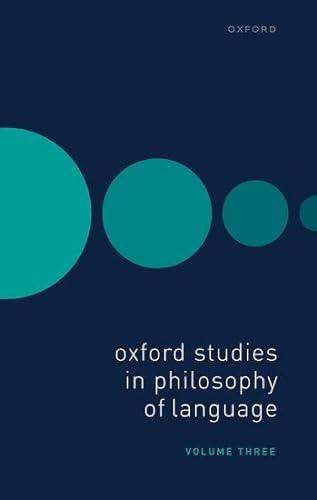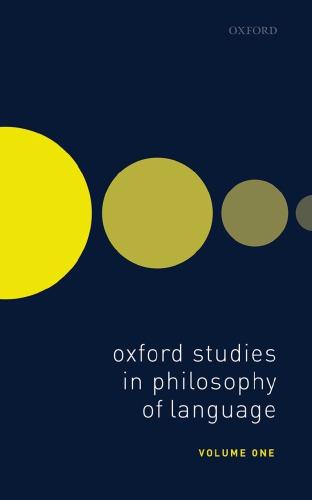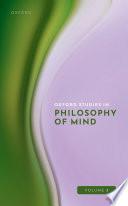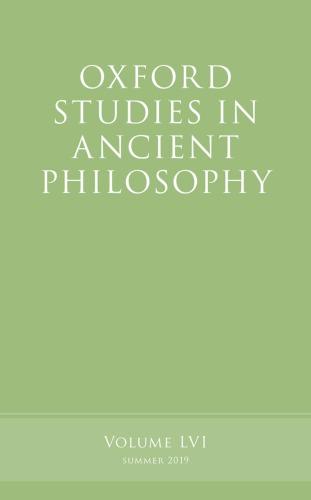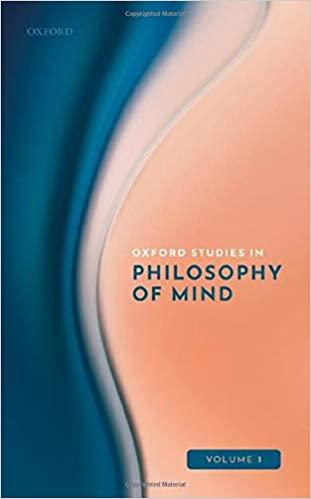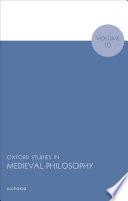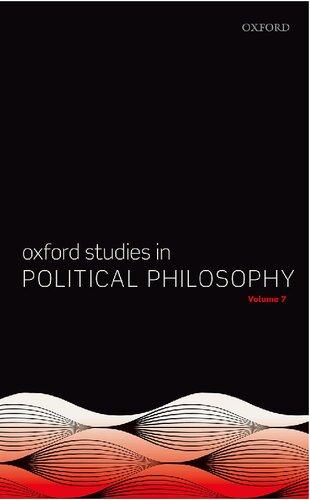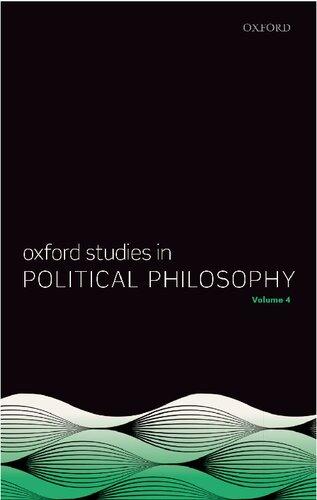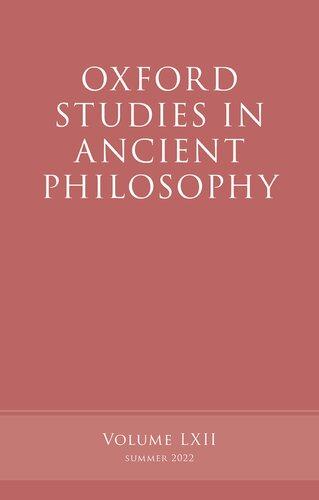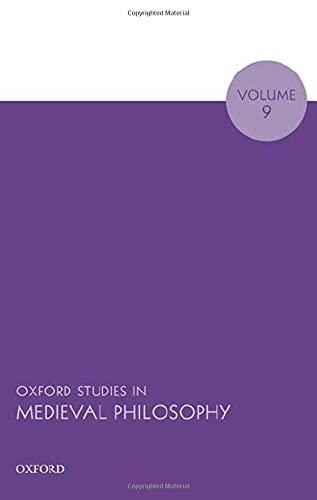Editors’ Preface
Withitsthirdissue, OxfordStudiesinPhilosophyofLanguage continues itsroleasaregularshowcaseforleadingworkinthisarea.Languagehas beenamainfocusofphilosophicalresearchsinceatleastFrege’sseminal contributionsattheturnofthetwentiethcentury.Beginningwiththat “linguisticturn,” importantworkallacrossphilosophyhasoftenbeen relatedinsomesignificantwaytophilosophyoflanguage.
Thisseriesoffersaregularsnapshotofstate-of-the-artpiecesinthis central field.Publishedbiennially,itaimstoserveasacuratedforumfor contributionsbysomeofthebestscholarsfromaroundtheworld,both seniorandjunior.Eachissueincludesasmallnumberofoutstanding papersinphilosophyoflanguage,broadlyconstrued.Thisthirdissueof ourseriesisanothergoodinstanceoftheform:itincludesninenew papersbyadistinguishedrangeofphilosophers.Together,thepapers provideaperspectiveonthestateofthesubdiscipline.
Inhis “ScoreboardsWithoutScorekeepers,” JoshDeveraimstosetout a “de-psychologizedperspective” onarangeoftheoreticalresourcesused bybothdynamictheoristsoflanguageandexpressivisttheorists.One importantsuchresourceistheideaofaconversational “scoreboard” (seeLewisforanimportantearlydiscussion),bywhichvariousconditionsofthecommunicativesituationarerepresented.Deverreviews “cognitivist” implementationsofthatideaand,whileappreciatingtheir attractions,notestheircontinuitieswithGriceanprograms,onwhich linguisticmeaningisseenasdeeplyintegratedwithsystematicpsychologicalandsocialphenomena;givenhispessimismaboutwhether therelevantpsychologicalphenomenaaresystematicintherequisite ways,heproposesanewprogram,onwhichthekeytheoreticalnotions aremind-independentphenomena,recommendingaccordinglyafully “non-cognitivist” metaphysicsforlinguisticscoreboards.Showingthat theproposednon-cognitivismhasnospecialproblemaboutconversationalparticipants’ knowledgeofwhat’sonthescoreboard,andthatitcan
accommodatepresuppositionfailure,Dever’sperspectivebidsfairto invertatraditionalconceptualsettingforpopulartheoreticalresources.
RachelGoodman’ s “Singularismvs.Descriptivism?” revisitsawidely endorseddistinctionbetween “singular” and “descriptive” thought, reviewingargumentsinfavoroftheexistenceofsingularthought.That setsthestageforarefinedaccountofthedebatebetween “singularists” whoaffirmthatsomementalstatesareaboutsomething(s) “directly” (withoutthemediationofdescription)and “descriptivists,” whooppose theideathatanyofourthoughtshavesingularpropositions(containing ordinaryexternalparticulars)astheircontents.Thatdebateconnects withissuesinphilosophyoflanguageconcerning “directreference,” and Goodmanshowshowsomeoftheconsiderationsderivingfromthe philosophyoflanguagethatmighthavebeenseenassupportinga singularistviewcanalsobeseenaschallengingit.Herpieceseeksto supportsingularisminawaythatwouldleaveitimmunetothechallengesderivingfromphilosophyoflanguage,ifalsoforgoingthesupport manysawlinguisticconsiderationsasproviding.Thecarewithwhich shepursuesthatattemptleadsultimatelytoanappreciationofthe dialecticalsubtletyofthedisagreementaboutFrege’sPuzzle.
“VerbalSignaling” offersMitchGreen’seffortto findcontinuities between,ontheonehand,paradigmaticlinguisticcommunication, whichsomeseeasrequiringcomplexsetsofintentionsaswellas conformationtonorms,andontheotherhand “signaling,” inwhich “anorganismconveysinformationtoapotentialrecipientinsucha waythatbothsenderandreceiverstandtobenefit.” Distinguishingthe verbalsignalfromtheverbal “index,” anddisentanglingdifferentstrands wrappedupinanotionofcommitmentassociatedwith assertion,Green contemplatestwopossibleprecursorstoassertion: “ursertion” and “semisertion,” eachwithdistinctivenormativeprofiles.Theseinturn promisetoenableanewunderstandingofsuchphenomenaasexpositives,grammaticalevidentials,andconversationalimplicature.
Althoughitmayhavebeenknownforsometimethatcontextdependenceposesaproblemfor “disquotationalist” theoriesoftruthand reference,RichardKimberleyHeckarguesthattheproblemgoesdeeper thanhasyetbeenappreciated.AccordingtoHeck’ s “Disquotation, Translation,andContext-Dependence,” thenotionsoftruthandreference
donotreallyapplytotypeexpressionsatall,givingdisquotational theories whichseektocharacterizetruthandreferenceintermsof conditionsonsentencetypes—“thewrongsubjectmatter.” Rejectingan attemptbyFieldtohandletheproblematiccontext-dependenceinquestion,Heckcontendsthatallformsof ‘translationalsemantics’ restupon use-mentionconfusionsandsocannothelpthedisquotationalist.While disquotationalismmustberejected, “intentionalrealism” doesnotfollow: thedependenceoffactsaboutcontentonpragmaticfactorsposesasgreat adifficultyforintentionalrealismasitdoesfordisquotationalism.
Cansubstantialmetaphysicalconclusionsaboutwhatrealityislikebe drawnfromfactsabouthowwerepresentreality?In “ThePlaceof PhilosophyofLanguageinMetaphysics,” ThomasHofweberarguesfor anaffirmativeanswer,onethatsustainsasignificantroleforthephilosophyoflanguageinmetaphysics(andhesuggeststhatasimilar structureholdsfortherelationbetweenepistemologyandmetaphysics). Forexample,Hofweberpointsoutthatconsiderationsinphilosophyof languagemightsettlethatnumberwordsarenon-referential:adding that “ifnumbertermsarenon-referentialthennaturalnumbersdo notexist,” heconcludesthatinvestigationofourrepresentations could deliversubstantialconclusionsaboutwhatrealityislike(innonrepresentationalrespects),givingphilosophyoflanguageaconstructive roleinmetaphysics.Thepiecethenconsiderswhetherthequestionsthat canbeansweredinthatway,throughinvestigationofourownrepresentations,aregoodquestions ortherightquestionstobeasking and indeedwhetherourmetaphysicalquestionsshouldbegivenanyspecial placeinmetaphysics.
MargaReimerherecontributestoarevivalofinterestinphilosophical workonlying.Her “OnLying, ‘StrictlySpeaking’” stakesoutasubtle combinationofthesesaboutlying:(i)deceptiveintentisnotnecessary forlyingbutisa “definingfeature” ofprototypicallies;(ii)whileonecan lieinaloosesense(onecan “basically” lie,orthelike)throughimplication,anyattempttodefineoranalyzelyingwouldhave “saying” asa necessarycondition;and(iii)tobeaptlydescribedas “aliar” mayrequire morethanthatonehavelied inparticular,itmayrequiredeceptive intent.Reimeraccordinglydistinguisheslying “strictlyspeaking,” lying “prototypicallyspeaking,” andlying “looselyspeaking,” andsuggeststhat
insensitivitytosuchdistinctionsmaypromptoverambitiousinterpretationsofexperimentalstudies.Ultimately,Reimerseesherworkasa demonstrationofhowthedistinctionsthatphilosophyseekstouncover canalreadybefoundinordinaryspeechandthought.
NathanSalmón,whoin Frege’sPuzzle (1986)andinaseriesofrelated papersdevelopedanddefendedwhatcanappropriatelybecalled “textbookMillianism,” herereturns inhis “ÀProposdePierre, DoesHe... orDoesn’tHe?”—totheanalysisofbeliefascription,andtohiswayof confrontingKripke’sPuzzleaboutBelief.SalmonviewsPierreasbelieving,butalsoaswithholdingbelieving,thatLondonispretty.Hisview postulatesarolefor guises,however waysoftakingaproposition, throughwhichbelieverscanbeararangeofcognitiverelationsto propositions.Inthepresentcontribution,Salmoncontendswithan alternative,purely “referentialist,” approachthatwouldopposeany involvementofguises.Onthisalternativeapproach(duetoCrawford 2004),oneusesthephenomenonofsecond-orderbeliefinan attempttoresolvethepuzzlingcases:insteadofdefiningthekeyconditionof withholdingbelief,asSalmóndoes,intermsofguises,one viewsitasamatterofbelievingthatonedoesnotbelieve.While Salmonrecognizesthisalternative’spositivefeatures,hegivesan example reminiscentofMach’sshabbypedagogue showingthatone cansometimesbelievethatonedoesnotbelievethat p evenwhen onedoes not withholdbeliefinthewaythat’scrucialforresolvingthe puzzles.
“TheSchmidentityStrategy” isaboutaneponymousstyleofargumentation firstbruitedbyKripkein NamingandNecessity andthen refinedinhis “Speaker’sReferenceandSemanticReference.” Thegeneral ideaisdeployedtoresistonekindofresponsetoMillianism aresponse accordingtowhich “CiceroisTully” does not expresstherelationof identitybetweentheobjectthatisbothCiceroandTullyanditself.The schmidentitystrategyproposesthat,whatever “is” inEnglishcurrently actuallyexpresses,becausesomewordcouldhaveexpressedtherelation ofidentity,holdingbetweeneachthinganditself,andsincethe samephenomenawouldariseinsuchcircumstances,thecontemplated sortofresponsetoMillianismisnotultimatelyadequate.JeffSpeaks hererevisitstheschmidentitystrategy,however,characterizingitmore
preciselyandconsideringextensionsthatmightindicatelimitations onitsdeployment,andevencastdoubtonitsdialecticalrole.Inparticular,Speaksinvestigatestheideaofsomething’sbeing stipulatedtobe true that figuresinthestrategyand distinguishingvarietiesoflinguistic stipulation,andattendingalsotothe scope ofthestipulationsinvolved proposesthatthestipulationsrequiredinsomeusesofthestrategymay beboundtofail.Ultimately,Speaksshowshowthedeploymentofthe schmidentitystrategyindefenseofMillianismmayinvolvewhat,to anopponent(thoughnottoaproponent),appeartobeproblematic presuppositionsabout,forexample,howdifferentacommunitywould havetobe,fromours,forittospeakalanguagewhosesemanticswasin factMillian.
StephenYabloisinterestedin “FregeCases” too:in “Leverage: AModelofCognitiveSignificance, ” Yablobringsmachinerythatwas originallydevisedinworkonaesthetics onmetaphor,irony,hyperbole, andtruth-in-a-story tobearonthevariationin cognitivecontent thatis supposedtobeexhibitedby “HesperusisHesperus” and “Hesperusis Phosphorus.” Therelevantvarietyofcognitivecontentsare incremental contentsofasortYablohasdiscussedpreviously(2012a,2014).Inthe currentwork,YablocitesHoek’s(2018)treatmentofincrementalcontent,whichadvertstoanewtheoreticalparameter: subjectmatter. Ultimately,Yabloarguesthatthecognitivecontentsgeneratedinthe wayheproposesareadequatetothecaseswantingexplanation:hesees thenotionsofsubjectmatterandofpivot-presuppositionsas figuringin amorecomplexstructure,astructureanalogoustothatofasimplelever andfulcrum.Iftheaccountheoffersissuccessful,wewouldhavea relativelysystematicandthoroughgoingseparationofsemanticcontent fromcognitivecontent.
Together,thisbroad-rangingsetofpapersrevealsthebreadthand depthofworkinphilosophyoflanguagetoday.Futureissueswillprovide anequallydiverse,rich,andvaluablecollectionofcontributionstothe discipline.
1 ScoreboardsWithoutScorekeepers
JoshDever
Twotemptingphilosophicalagendas:
• Philosophyoflanguageisjustasubdisciplineofthephilosophyof action!Languageusesarejustparticularstrategicactions,and everythingweneedtoknowaboutlanguagecanbeextractedfrom considerationofthepracticalrationalityofsuchstrategicactions.
• Philosophyoflanguageisjustasubdisciplineofthephilosophyof mind!Languageusesarejustexpressionsofcertaincomplexmental statesdesignedtobringaboutothercomplexmentalstatesinother minds,andeverythingweneedtoknowaboutlanguagecanbe extractfromconsiderationofthecognitivetheoryofsuchmental states.
Bothofthesetemptingagendaspushourtheorizingaboutlanguagein apsychologizeddirection.Buttherearealsopressures from(e.g.)the roleoftruthconditionsandinferentialrelationsinlanguage thatpush inanantipsychologisticdirection,andweseeinboth(forexamples) Frege’suseofthecontextprincipleinthe Grundlagen toavoidinfiltrationofpsychologicalconsiderationsintothesemanticsofnumbertalk andthesemanticexternalists’ argumentsthatmeaningsain’tinthehead routesforrespectingthosepressures.
Somebattlesmustbefoughtbyeachgenerationanew,andthepsychologistic/antipsychologisticbattleinthetheoryoflanguageisoneof them.¹Recentlytherehasbeenaconvergenceoftheoreticalinterest
¹Thathistoricalobservationismeanttobeneutralonthequestionofwhooughttowinthe battle.
JoshDever, ScoreboardsWithoutScorekeepers In: OxfordStudiesinPhilosophyofLanguageVolume3. Editedby:ErnieLeporeandDavidSosa,OxfordUniversityPress.©JoshDever2023. DOI:10.1093/oso/9780198892724.003.0001
betweendynamictheoristsoflanguage,whopositcomplexrepresentational/ informationalconversationalscoreboardsupdatedbylanguageuse,and expressivisttheoristsoflanguage,whotaketheroleoflanguagetobeto expressandmakemanifestourmentalstates.Onewaytomanifestthe mentalstatesistomakethembethescoreboardsthedynamicists manipulate.Onthispicture,thegoalofconversationistocreateakind ofpublicmind weexpressourmentalstatesbyimposingthemonthe publicscoreboard.Wearethusthescorekeepers thepublicmindof thescoreboardisa “littleus”,andweareitskeepers,responsibleforits growththroughoutthediscourse.
Butwecanhavescoreboardswithoutscorekeepers.Theaimofthis paperistosetoutadepsychologizedperspectiveonthepowerfulsemantictoolsthatdynamicistsandexpressivistshavebeendeveloping.
1.1Anintroductiontoscoreboardtechnology
Scoreboardshavegrownmoreelaborateandsophisticatedovertheyears. AnearlyscoreboardforaHarvardfootballgamein1893trackedscores forbothteams,quarter,down,andballposition,withthescoreboard contentupdatedmanuallybyascorekeeper.Asscoreboardtechnology improved,scoreboardupdatingbecameincreasinglyautomatedandthe gamefeaturestrackedincreased gameclockswereadded,additional playerstatisticsweretracked,scoresforotherout-of-towngameswere displayed.Thecurrentscoreboardstate-of-the-artistheInfinityScreen atSoFiStadium itislargerthanthegame fielditself,andisdynamically capableofdisplayingmoreorlessanyinformationaboutthegame,and effectivelyabsorbsthegameitselfintothescoreofthegamebyincorporatinginstantreplayandlivevideocoverageaspartofthescore.
Linguisticscoreboardtechnologyisnewerthansportsscoreboard technology,andlagssomewhatbehind.²The firstclearlinguisticscoreboardsareintroduced,ofcourse,byLewis(1979),althoughthecore
²Notreally. Theorizing aboutlinguisticscoreboardtechnologyisanewactivity,butthe scoreboardtechnologyitselfisperhapstheoldesthumantechnologicalpossession.Howit comparesasapieceoftechnological flashisperhapsamatterofindividualtaste.
deviceisinplacealreadyinLewis(1969)’sdiscussionofcommon knowledge,andespeciallyinStalnaker(1974)’simplementationofcommonknowledgeasadedicatedpieceoflinguistictechnology.Lewisian scoreboardsarealreadyexpressiveand flexible amongthescoreboard componentsthatLewisdiscussesareabodyofinformation,acomparativesaliencerelation,astandardofprecision,amodalhorizon,and aplan.
Theinterveningyearshaveseenanexplosionbothofnewscoreboard componentsandoffunctionalityofthosecomponents.Considerwhat you ’relikelyto findonacurrentindustry-standardlinguisticscoreboard:
• Acommonground,consistingofasetofworlds(orsetofpropositions,dependingonyourpreferred finenessofgrain).Thecommon groundtrackstheconversationalcontributionofassertions,guides beliefformationbyconversationalparticipants,anddetermines presuppositionsatisfaction.
• Ato-dolist,consistingofalist(orset?)ofactions(orpropositions, dependingonyourpreferredphilosophyofaction).Theto-dolist trackstheconversationalcontributionofimperativesandguides domaingoalformationbyconversationalparticipants.³
• Aquestionunderdiscussion(QUD)stack(ofquestions,typically conceivedofassetsofquestionanswers).TheQUDstacktracks theconversationalcontributionofinterrogativesandstructures
³Whyisn’tthereapresuppositionanalogfortheto-dolist?Imperativescanofcourse,likeall speechacts,carrypresuppositions consider Stopsmoking! Butthesepresuppositionsare informationalpresuppositions,andaresatisfied(ornot)incommonground,notintheto-do list.Theacceptabilityoftheimperative Stopsmoking! requiresthatcommongroundcontainthe informationthatthecommandeepreviouslysmoked,notthattheto-dolistcontainstheaction ofpreviouslysmoking(oranyotheraction).Twopossibleanswers.Firstanswer:perhapsthere issuchananalog.(Ratherthan ‘presuppositions’,perhapsweshouldcallthem ‘prejussitions’ Iwon’t,though.)Considerthecommandsequence Startsmoking!Thenstopsmoking! Perhaps thechange-of-statetriggerof ‘stop’ ishereaccommodatingintheto-dolistviatheprevious imperative Startsmoking!,ratherthanincommonground.Butitishardtogetentirely convincingcases.Ifthereisadefaultexpectationthatcommandswillbeobeyed,thenthe issuingofthe firstcommand Startsmoking! mayplaceinformationaboutfuturesmokingin commonground,aswellasontheto-dolist.(Consider:A. Startsmoking!,B. No,I’mnotgoing todothat.,A. Thenstopsmoking!)Wheninformationaboutpriorsmokingisincommon ground,thereisneverapresuppositionalbarriertotheuseof Stopsmoking!,whichmakesit hardtoisolateaprejussitionalreadingifthereisone.Secondanswer:thestructureofthe scoreboard,andinparticularfunctionaldistinctionsbetweenthecommongroundandthetodolistcomponentsofthescoreboard,explainthedifference.SeeSection1.5forelaboration.
relevancerelationsaswellasanumberofrelevance-downstream phenomenasuchasanaphoraresolutionandinterpretationof focus-sensitiveoperators.⁴
• Acollectionofdiscoursereferents,containingdiscoursereferents introducedbyappropriateexpressions(paradigmatically,indefinite descriptions).Discoursereferentsthencontrolpermissibilityand interpretationofusesofpronouns.
• Amodalhorizon(givenbyasetof ‘liveoption’ worlds)andan(or multiple)orderingsource(s)(givenbyanorderingrelationon worldsorasetofpropositionsfromwhichanorderingrelation canbeextracted),whichjointlygoverntheinterpretationofa numberofmodalandmodal-adjacent(conditionals,evidentials, ‘knows’ , ‘wants’)expressions.
• Quantifierdomainrestrictions,orfunctionsfromobjectstosetsor properties,which(unsurprisingly)controlthedomainsoverwhich variousquantifiersrange.
• Comparisonclassesordegreefunctionrangesgoverningtheinterpretationofscalaradjectives.
• Adistinctionbetweenforegrounded/at-issueandbackgrounded/not-at-issueinformation,used(forexample)indeterminationof thefelicityofutterancesinvolvingevidentials.
Andmuchmuchmore.Fancierlinguisticscoreboardsmayalsosupport ‘screenwithinascreen’ technology,allowingfornestedhierarchies ofscoreboardswith(forexample)conditionalconstructionstriggering thecreationoftemporarysubordinatescoreboardsinheritingsomebut notallfeaturesfromtheprimaryscoreboard.(Thenestedstructureof discourserepresentationstructures(DRSs)inDiscourseRepresentation Theoryisaparadigmexampleofscreen-within-a-screen,butthebasic ideacanbeimplementedinmanyscoreboardecosystems.)
⁴ Followingonthepreviousfootnote,wecouldwonderabout prequisition aswellas presuppositionandprejussition.Infact,licensingrolesoftheQUD(e.g.,inlicensinganswerformassertionsorinlicensingfocusdistributions)canbethoughtofastypesofprequisition. Relevanceimplicaturesmoregenerallymightprofitablybereconceivedasatypeofprequisition accommodation.Declarativesandinterrogativesbothseemmoredeeplyintegratedintothe mechanicsofscoreboarddynamicsthandoimperatives;thisfactemergesagainwhenIdiscuss (whatItaketobe)thenon-existenceofprejussitioninSection1.5.
Sportsscoreboardsaretypicallyinput-only thecurrentcontentof thescoreboardis fixedbythepasteventsofthegame,butthesubsequent eventsofthegamearen’tdeterminedbythecurrentcontentsof thescoreboard.⁵ Butconversationalscoreboardstypicallypointboth upstreamanddownstream.Afulllinguisticstoryneedstotellusboth (a)howthecontentsofthescoreboardarealteredbymovesmadeinthe languagegame(theupstreamconnection)and(b)howthelinguistic impactofamoveinthelanguagegameisaffectedbythepriorcontents ofthescoreboard(thedownstreamconnection).⁶ Theclassicalstatic storyhasitthatthelinguistic flowthroughthescoreboardisa flowof propositions.Anutterance,madeagainstthebackdropofagivenscoreboard,launchesapropositionatthescoreboard.Uponimpact,the propositionaltersthecontentsofthescoreboard.⁷ Thealteredscoreboardtheninfluencedwhichpropositionislaunchedbythenextutterance,andsoon.Butit’salsotemptingatthispointtocutouttheclassical propositionalmiddlemen.
Absentpropositionalmiddlemen,ourtheorybecomesdynamic.We canadoptaproceduralsemanticsandassociatesentences(morebroadly, linguisticmoves)withupdatefunctionsthatmapfrompriortoposterior scoreboardcontents.Statictheoriescanbemodeleddynamically a staticpropositionalcontentgivesrisetoupdatefunctionsspecifying
⁵ Typically,butnotalways.Whenthebasketballplayertakesalow-percentageshotbecause thescoreboardshowstheshotclockwindingdown,thescoreboardisinfluencingsubsequent play.Ofcourse,ifpastplayinfluencesbothcurrentscoreboardandfutureplay,itmaybe possibletoextractspuriousnon-causalcorrelationsbetweencurrentscoreboardandfutureplay. Determiningwhenthescoreboarditselfhasdownstreamconsequencesmaythenbeempirically difficult(andmaybeevenmetaphysicallyunderdeterminedintherightsituations),butthere’ s noprincipledproblemwiththedistinction.(Didtheplayershootbecausethescoreboard showedtheshotclockwindingdown,orjustbecausetheshotclockwaswindingdown? Absentscoreboarderrors,itmightbedifficultto tell,butafullcausalhistoryshouldreveal whichledtotheplayeraction.)
⁶ Asinthepreviousfootnote,therecanbehardquestionsaboutwhetherdownstream utterancecontentis fixedbythecurrentscoreboardorbytheupstreamlinguisticplaythat fixedthecurrentscoreboard.Asbefore,wecanperhapslooktoscoreboarderrorforinsight, althoughitmaybemoredifficulttosaywhatitisforalinguisticscoreboardtobe ‘inerror’ than foranathleticscoreboard.(Moreonthisbelow.)Againseparatingtheepistemologyfromthe metaphysics,wepresumably(inthetypicalspecialsciencesway)wanttoseeifexplanationsof downstreamcontentviascoreboarddisplaysproduceatheoreticalunitythatallowsricher explanations.
⁷ Inthesimplestmodels,byaddingthatpropositiontothecommongroundcomponentof thescoreboard.Butmuchmoresophisticatedstaticmodelsareavailableaswell.
whatscoreboardchangeresultsfromtheintegrationofthatproposition.⁸ Butmanyupdatefunctionscan’tbederivedfrompropositionalseeds,so weopenthesemanticspacetoabroaderrangeofupdateswhenwethrow openthedynamic floodgates.⁹ Forexample,inthedynamicsetting, possibilitymodals ◊X couldperformtheminimal expansion ofthe scoreboardtoincludeamodalhorizonsupporting X,whilenecessity modals □X couldperformaminimal contraction ofthescoreboardto includeamodalhorizonsupporting X.¹⁰ Thesesortsofexpansionand
⁸ Theprincipalultrafiltersofscoreboardupdates,asitwere.Pointing,ofcourse,tothe obviousresearchproject.
⁹ ThestandardcharacterizationmovehereisthatofvanBenthem(1986),whoobservesthat whenthescoreboardcommongroundisconceivedasasetofworlds,propositionally-triggered updatesareexactlythosethatarebothconservative(theyneverexpandthatset)andcontinuous (theoutputoftheupdatefunctiongivenapriorscoreboardsetofworldsistheunionofthe severaloutputsoftheupdatefunctiononthesingletonsoftheworldsinthatpriorset).It’seasyto pointtopotentialexamplesoflinguisticphenomenalackingoneorbothofthesefeatures retractionslooknon-conservative,asdodynamicpredicativelogic(DPL)usesofexistential quantifiers(GroenendijkandStokhof(1991));modalsandconditionalsastreatedin(e.g.) UpdateSemantics(Veltman(1996))looknon-continuous.Butacarefulexaminationofthis standardcharacterizationrevealsahostofdifficulties.Roughly,themorecomplicatedour scoreboardsbecome,thelessobviousitiswhatitmeansforanupdatetobeconservative(not tolosecurrentscoreboardcontents butwithamoreexpansivescoreboard,lossesareinevitable (thegameclockisalwayslosinginformationaboutremainingtimeandreplacingitwithnew information))orwhatitmeansforacontenttobecontinuous(nottodependonholisticfeatures ofthescoreboard butwithamoreexpansivescoreboard,it’slessclearwhatthescoreboard atomsare(pixels,wheninstantreplayisincluded?)).Thispaperisonlytangentiallyaboutthe static/dynamicdispute,butit’smaybehelpfultopointoutthatthisdisputeinvolvesatleasttwo severableelements.Onequestioniswhereto ‘put’ acertainrangeofscoreboardupdating effects a dynamicpragmatics (e.g.,Stalnaker(2018))putstheseupdatesintothepragmatic portionofthetheory,livingontopofastaticsemantics,whereasa dynamicsemantics (seeYalcin (2014)foranoverviewofextensiveoptionsinthiscamp)treatstheupdateeffectsaspartofthe core(‘conventional’)semanticpropertiesoftheutterance.Wheretodrawthislineisafunctionof whatthedrawingofthelineisintendedtoachieve;Icontinue(Dever(2013))tobeuncertainon thatlattertopic.AnotherquestionishowtocharacterizewhatRothschildandYalcin(2016)call theconversationalsystemsdynamics.RothschildandYalcin(2015)makehelpfuladvanceson thevanBenthemcharacterizationjustdiscussed,observingthataformofantisymmetrycharacterizesaninterestingclassofsystemsthatfaileventobewhattheycall weaklystatic.But althoughRothschildandYalcingiveausefullyabstractperspectivethatprescindsfrommanyof the(optional)detailsaboutscoreboardcontentsthatdrivevanBenthem’sresult,thesignificance oftheirformalpicturestilldependsonunsettledquestionsaboutscoreboardstructure.Suppose, forexample,thatscoreboardsare mnemonic,inthatascoreboardencodessequentialinformation aboutallpreviousstatesofthatscoreboard.AnysuchsystemwillviolateRothschildandYalcin’ s principleofantisymmetry,butonthefaceofiteventhemoststaticsystemcanbeimplemented inamnemonicform.
¹⁰ That’sonlya firstgesturetowardadynamicproposal,notanactualtheory.Oneobvious problemisthatminimalexpansionsandcontractionsmaynotbedefined.(Supposewehavethe fourworlds w₁ =PQ, w₂ =Pq, w₃ =pQ,and w₄ =pq,andconsideranutteranceof ◊p againsta scoreboardwhosemodalhorizoncontainsthetwoworlds w₃ and w₄.Istheminimallyexpanded modalhorizon{w₁, w₃, w₄}?{w₂, w₃, w₄}?{w₁, w₂, w₃, w₄}?)Similarchoicepointsarisewhenwe
contractionoperationsaren’teasilymodeledasresultsofaddingparticularpropositionstotheconversationalrecord,andsorewarda proposition-independent,scoreboard-orienteddynamicapproach.
1.2A firstpassatscoreboardmetaphysics
Muchneedstobedoneifscoreboardsaregoingtoreplacepropositions.¹¹ Propositionsareatheoreticalnexusforacollectionofdemandsderiving fromtheoriesoftruth,mind,modality,rationality,andothers ifwe’ re goingtorestructurethingsaroundscoreboards,weneedtoshowhow scoreboardsalsocanoccupythatnexus,ordisentanglethevarious threadsthatpropositionsknotted.HereIwanttofocusonjustone aspectoftheneededwork.Ifwearegoingtocenterscoreboardsinour linguistictheorizing,weneedgoodtheoriesabout whatscoreboards are notlinguistictheoriesaboutwhatscoreboardscontainandhow theyarestructured(althoughwedoneedthose),butmetaphysical theoriesabouttheirnature.Theliteratureonthemetaphysicsofpropositionsislargeandactive,andhasprovidedusbothwithanumberof metaphysicaloptionsforthenaturesofpropositions(setsofpossible worlds,certaincomplexesofobjectsandproperties,certainkindsoffact, certainkindsofmentalacts,certainkindsofproperties,abstractions fromcertainmentalfeatures,orsimplemetaphysicalquietism,tonamea few)andwithanumberofchallengesto(andresponsestochallengesto) formalconsistencyoftheoriesofpropositions,centeringaroundthe
seekaminimalcontractionforanecessityclaimscopingoveramodal,suchas □◊p.Doesthe necessityoperatorcontractcommongroundaswellasthemodalhorizon?Ordoesthemodal onlycontractthemodalhorizon,leavingittointernalequilibriumtendenciesofthescoreboard toadjustcommongroundtomatch?(Thehomeostaticsoflinguisticscoreboardsisaneglected topic.)Thedynamicsemanticist’sperspectiveislikelytobethatsuchundefinednessisinthe endagoodthing theneedtogivewell-definedupdaterulesprovidesausefulepistemicprobe intoscoreboardstructure,bypromptingustoconsiderwhatscoreboardswouldneedtobelike toallowlocationof(e.g.)minimalcontractions.(Theminimalexpansionproposal,forexample, invitesborrowingfromtheextensiveformalbeliefrevisionliterature(seeHansson(1999)fora thoroughoverview)anditsmethodsfordealingwiththeretractionproblem(and,inparticular, forstructuringbeliefstatessoastomaketheretractionproblemtractable).)
¹¹Someofthosethings,includingthemetaphysicalthingsthatprimarilyanimatethispaper, needtobedoneevenifscoreboardsareanadjunctto,orevenaneffluenceof,propositions.But theprojectsaremoretheoreticallypressing,andattimesneedtobepursuedindifferentways,if there’safull-onreplacementagenda.
Russell-Myhillparadox.¹²Noneofthisworkhasbeendone,andvery littlehasevenbeenstarted,forthecaseoflinguisticscoreboards.
Lewis’soriginaldiscussionofscoreboardscontainssomebriefremarks onscoreboardmetaphysics:
Totheextentthatconversationalscoreisdetermined,giventhehistory oftheconversationandtherulesthatspecifyitskinematics,these rulescanberegardedasconstitutiverulesakintodefinitions.Again, constitutiverulescouldbetradedinforexplicitdefinitions:the conversationalscorefunctioncouldbedefinedasthatfunctionfrom conversationstagesto n-tuplesofsuitableentitiesthatevolvesinthe specifiedway.
Alternatively,conversationalscoremightbeoperationallydefinedin termsofmentalscoreboards–somesuitableattitudes–ofthepartiesto theconversation.Therulesspecifyingthekinematicsofconversational scorethenbecomeempiricalgeneralizations,subjecttoexceptions, aboutthecausaldependenceofwhatthescoreboardsregisteronthe historyoftheconversation.(1979,pp.345–6)
Lewisisdirectlyaddressingthenatureof scores here,butapictureof scoreboards cantheneasilybeextracted.Ononeoption,thescoreboard isanabstractmathematicalentity(thescore is thescoreboard,thoughtof
¹²Obviousquestion:isthereaversionoftheRussell-Myhillparadoxforscoreboards?If scoreboardscontainpropositionsasconstituents(forexample,aspartofcommonground),and areindividuatedbycontainedpropositions,andarepropositionallypermissiveinallowingany propositiontooccurasaconstituent,thenpropositionalRussell-Myhillargumentsareautomaticallyinheritedbyscoreboards.ButforthatparticularRussell-Myhillroute, solutions tothe Russell-Myhillparadoxarealsoinherited if,forexample,wethinkthatRussell-Myhillistobe avoidedviasomedegreeofcoarse-grainingoftheidentityconditionsforpropositions(perhaps Booleanism,asinDorr(2016)orClassicism,asinBaconandDorr(forthcoming)),thenthe individuationofscoreboardsviapropositionalconstituentswillbeautomaticallycorrespondinglycoarse-grained.ButthericherstructureofscoreboardsmayallownovelroutestoRussellMyhilltypeworries.Forexample,ifdiscoursereferentsareindividuatedbytheirexternal anchors(notanobviousassumption),andscoreboardsarebothindividuatedbytheirdiscourse referentsandpermissiveinallowingthatwhenevertherearesomediscoursereferents,thereisa scoreboardcontainingallandonlythosediscoursereferents,thenanewRussell-Myhillproblem arises.Thereisalottobeworkedouthere,butonesuggestivefactisthatthestandardcoarsegrainingmovessuchasBooleanismaren’tgoingtobeofanyhelpinavoidingRussell-Myhill worriesderivingspecificallyfromthediscoursereferentcomponentofthescoreboard.More generally,thestructuringfeaturesofscoreboardsdifferfromthoseofpropositionsthatmakeit hardgenericallytoportlow-structuretreatmentsfromoneenvironmenttotheother.
inthisway);ontheother,thescoreboard(s?)is(are)amentalstatewhich then fixeswhatthescoreis.¹³
SomethingbroadlyinthetraditionofLewis’smentalstatepicture(but reallymoreinaStalnakeriantradition,developingfromworkonthe natureofcommonground)hasbecometheindustrystandardforthe metaphysicsoflinguisticscoreboards.Onthisindustrystandard,scoreboardsarea(oraredeterminedby;theexactdetailsofwhetherthisisa reductiveanalysisorsomethinglikeagroundingstorywon’tdistractus here)certaincombinationof psychological and epistemic facts.Sincethe epistemicfactsareprimarilyroutedthroughepistemically-constrained mentalstatesofcommonknowledge,we’llcalltheresultingpicturea
¹³Lewisalsoexpressesdissatisfactionwithbothoftheseoptions.Onthe ‘mathematical’ side, henotesthatthe rules forscoreboardkinematicsmayunderdeterminewhatthesubsequent scoreboardstateis.Merekinematicunderdetermination,though,isn’tenoughtocreatea problem sofar,wecouldmerelyreplaceanupdatefunctionwithanupdaterelation,allowing multiplescoreboardstobedescendantsofthecurrentscoreboard(or,equivalently,trafficin higher-orderscoreboardstakenassetsoflower-orderscoreboards,andthentranslateunderdeterminationoflower-orderkinematicsintoadeterminate-but-expandinghigher-orderkinematics).It’sonlywhenweaddtheassumptionthat,eveninthefaceofmultiplerule-conforming candidatesfortheposteriorscoreboard,thereisonescoreboardthatis thetruescoreboard that theseunderdetermination-absorbingmovesbecomeunsatisfactory.Wethenneedtoknow whencetheprivilegedstatusoftheonetruescoreboardarises ifnotwithintherules,or someothersuitablyabstractablefeature,thenthemathematicalapproachwillcertainlybe problematic.(ThereisanobviousconnectionherewithLewis’spictureoftheactuallanguage relationinLewis(1975),wheretheneedastheactuallanguagerelationasasupplementtothe abstractedmathematicalcharacterizationoflanguagesisdrivenbytheneedforsomeempirical tiebreakeramongtheunderdeterminedcandidates.)Wewillreturntotheprivilegingquestion below.Onthe ‘psychological’ side,henotesthatitmaybedifficult(‘withoutriskofcircularity’) tospecifytherightmentalstatestoconstitutethescoreboard.TheCognitivistmetaphysicsof scoreboardsdiscussedimmediatelybelowcanbethoughtofasaresponsetoLewis’schallengeof difficultyhere;wewillreturnbrieflybelowtocircularityworries(althoughIamnotconfident thatthecircularityworryIfocusonisthesamethatLewiscautionsagainst).Lewis’ sown proposal(“amiddleway”)followshisusualapproachtotheoreticalterminologybyfunctionalizingasecond-orderdefinitionoutofthetheoreticalrole,andthentakingthetheoreticalobject itself(inthisworld)tobetherealizerofthesecond-orderdefinition.ThusLewissuggeststhat “therulesspecifyingthekinematicsofscore ...specifytheroleofascoreboard;thescoreboardis whateverbest fillsthisrole”.Butatthesametime,heseemstopresupposethatitwillbemental featuresofconversationalscoreboardsthatprovidethat “whatever” : “weassumethatsomeor othermentalrepresentationsarepresentthatplaytheroleofscoreboard,inthefollowingsense: whattheyregisterdependsonthehistoryoftheconversationinthewaythatscoreshould accordingtotherules”.(Sothe “onetruescoreboard” is fixedbywhatmentalstatesthere actuallyare thatplaythescoreboardrole,evenifmorethanonementalstatetypecouldplay that(underdetermined)role.)Whenthetheoreticalfunctionalismisthuspinnedtoamental whiteknight,thequestionbecomeswhetherthemindcontainstheneededknight,andthe Cognitivisttraditiondiscussedbelowisthequestforthatknight.Ifnotthuspinned,the questionbecomeswhetherthereisanythingthatbest fitstherole.(Iassumethatthelogicof ‘best fitting’ doesn’tguaranteetheexistenceofanycandidatebest-fitters.)
Cognitivistpictureoflinguisticscoreboards.TheCognitivistpicture startswithabasementalattitudeof acceptance.We’llrun firstwiththe illustrativeexampleofthecommongroundcomponentofscoreboards; how(andif)togeneralizetootherscoreboardcomponentswilloccupy uslater.Theacceptancepicture:commongroundrepresentsabodyof informationsharedbytheconversationalparticipants.It’stemptingto thinkthatthatinformationisshared,inthe firstinstance,bywayof being believed.Butstandardexamplesshowthatbeliefisn’ttheright attitude.Informationcanenterintocommongroundevenwhennot believedbyall(orevenany)oftheparticipants aswhenapresuppositionalutteranceisallowedevenwhensomedon’tbelievethepresupposition(weallow “John’sspousewillbeattheparty” eventhoughwedon’t believethatJohnandhispartneraremarried,therebycontributingto commongroundcontaining thatJohnismarried),orwhenadiscourseis carriedonunderamodethatisn’ttruth-oriented(weallowtheutterance “TheHulkisstrongerthanSuperman”,andthuscontributetocommon groundcontaining thattheHulkisstrongerthanSuperman,despitenot believingthis,becauseourgoalisto fictionallyspeculate,nottodescribe theworld).Insteadwewantsomeotherlesscommittalattitudethatwe’ll stipulatively(followingStalnaker)call acceptance. Butcommongroundisnotjustthatwhichisaccepted,oreventhat whichisacceptedbyallconversationalparticipants.Becauselinguistic interactionismeanttobeacollaborativeandcoordinatedactivity,we wantthelinguisticscoreboardtobethekindofthingthatcanrationalize andexplainsuchcollaborationandcoordination.Butastandardpicture derivingfromgametheory,andconsiderationoftheByzantineGenerals problem(Lamportetal.(1982))suggeststhatinordertoachievethe neededcoordinationsomeformofcommonattitudeisneeded.Ifweall acceptthat p,butsomeofusaren’tawarethatothersofusacceptthat p, thenwewon’tbeabletorelyonacceptanceof p whenplanningconversationalcontributions.(Andsoonforunawarenessthatweareallaware thatweacceptthat p,andfurtheriterations,forincreasinglyrecondite conversationalplanninginstances.)
Therequiredcommonattitudeisthentypicallydefinedviaiteration. Thatwhichiscommonly φ ’disthatwhichis φ ’dbyallparticipants,and φ ’dbyallparticipantstobe φ ’dbyall,and φ ’dbyalltobe φ ’dbyalltobe
φ ’d,andsoon.Buttheiteratedattitudecan’tbeacceptance.¹⁴ Onecan acceptthatJonesismarriedwithoutbelievingthatJohnismarried,and thatacceptancecanhelpexplainconversationalbehavior(willingnessto useandappropriatelyinterpret “John’ sspouse ”,forexample).Butifone merelyaccepts,withoutbelieving,thattheotherconversationalparticipantsacceptthatJohnismarried,itwon’tmakesensetoplanorinterpret conversationalcontributionsontheassumptionthatothersacceptthat Johnismarried.(Onecanspeakonthebasisofacceptanceof p because, solongasweareallspeakingasif p,onecanpredictreceptionof utterances(e.g.)presupposing p.Butwhatmattersiswhetherwe really are speakingasif,notwhetherweare speakingasifwearespeakingasif.) Ifourgoalistoexplaincoordinatedbehavior,weneedatleastiterated belief;ifwewantto rationalize behaviorandweagreewith(e.g.)
HawthorneandStanley(2008)thatsomethingisareasontoactonlyif weknowit,thenweneediteratedknowledge.
The finalCognitivistpicture:thelinguisticscoreboardisconstituted bythecommonknowledgeofacceptancebyallconversationalparticipants. X isonthescoreboardjustincaseeveryone(withproperdomain restriction)¹⁵ acceptsthat X,andeveryoneknowsthateveryoneaccepts that X,andeveryoneknowsthateveryoneknowsthateveryone acceptsthat X,andsoon.¹⁶ (Twoversionsofthispicture:(i)whatthe scoreisisconstitutedbytheseCognitive = psychological/epistemicfacts, butthescoreboarditselfrecordingthatscoreisanabstractmathematical entity(towhichtheconversationalparticipantsstandintheactual scoreboardrelationbyvirtueofthatoneentityreportingwhatthe scorereallyis),and(ii)notjustthescore,butalsothescoreboarditself, isconstitutedbytheCognitivefacts,sothatthescoreboardisa
¹⁴ ThispointismadebyStalnaker(2002).
¹⁵ Anygoodaccountofscoreboardtechnologyneedsastoryabouttheboundaries ofconversations bothsynchronic, fixingwhichpeopleandwhichutterancesarepartof theconversation,anddiachronic, fixingwhentheconversationbeginsandends.Iwon’thave anythinggoodtosayabouttheseboundaryproblems.(Isuspectthatothersalsodon’thave anythinggoodtosay.)Myroughsuspicionisthatthesynchronicproblemisharderfor theCognitivistaccountthanforthealternativeI’llsetout,andthatthediachronicproblemis harderformyalternativethanfortheCognitivist.ButIwon’tattempttobackupthatsuspicion withactualarguments.)
¹⁶ Probablyboththe dere andthe dedicto readingsofallofthosequantifiersareneeded,at everylevelofiteration.
Cognitive,ratherthanamathematical,entity.FortheCognitivist,it doesn’tlooklikethere’sanythingatstakeinthischoice,butitwill loomlargerforthealternativeI’llsetoutsoon.)
It’seasyto findtheCognitivistpictureattractive.It’snaturaltothink thatlanguageisahumancognitivetool thatlanguagemeanswhatit doesbecauseofourthoughtsandourpurposesinusingthelanguage, andthattheuseoflanguageisatoolforachievingcognitivecoordination withotherspeakers.Cognitivismgivesusalinguisticontologythat makessenseoflanguageasacognitivetool,andanintegrationbetween languageandmindthatmakessenseofwhywecareaboutlinguistic meanings theroleofutterancesinupdatinglinguisticscoreboards simplytrackstheroleofthoseutterancesineffectingchangesinthe mentalstatesofconversationalparticipants,aswellasinourcommon awarenessofthosechanges.Andtheshiftfrompropositionstoscoreboardsgivesuslinguistictoolsthatcantrackandreflectawiderrangeof mentalstates curiosities,preferences,plans,attentions;aswellas beliefs.Iflinguisticmeaningsarescoreboardupdates,andifscoreboards justarecollectiveCognitivefeaturesofus,thenthere’salsoaclear epistemologyforlinguistictheorizing toworkoutlinguisticmeanings justistoworkouthowwechangeourcollectivementalstatesupon exposuretolinguisticutterances.Thatclearepistemologygivesasensible place,butnotauniquelyprivilegedrole,forarmchairreflectionon linguisticmeaning.
Despitethisattractiveintegrationofmindandlanguageofferedbythe Cognitivistscoreboardaccount,Iwanttoofferanalternativemetaphysicsofscoreboardsthatenforcesasharpseparationbetweenwhatthe languageprovidesandwhat’sgoingoninourheads.Isay “despite”,but morehonestherewouldbe “becauseof ”.¹⁷ TheintegratedCognitivist pictureshareswith,forexample,theGriceanprogramtheaspirationof treatinglinguisticmeaningasacertainwell-behavedcornerofhuman psychology(andsociology) wegetatheoryoflanguageassuchbecause
¹⁷ I’llretain “attractive”,though Iacknowledgetheattraction.Manyauthorshavebeen drawnintoopeningpaperswithclaimslike “Humanlanguagesaresophisticatedtoolsfor transferringmentalstatesfromonepersontoanother” (Dever(2012)).Suchitistobein gripsofapicture!(Asthereplacementpictureofferedherehopefullymakesclear,I’mhappyto endorsethatclaimwith “canbeusedas” replacing “ are ”.)
wediscoverthatthevarious “thought-transference” and “mind-reading” strategiesthatwedeploysystematizearoundsomemathematically tractablestrategicclusters.(Communicativeintentions,conversational maxims,andepistemicrelianceonconventionalregularitiesinthe Griceancase;updatefunctionsandscoreboardsintheCognitivist case.)ButIsharewith(e.g.)BuchananandSchiller(2022)apessimism aboutwhetherourpsychologyisevenlocallyandheuristically systematizableinthisway.Isuspectanyattempttosieveatheoryof languageoutofthesoupofhumanpsychology findsthelumpsof meaningincreasinglydissolvingintoageneralcognitiveslushinwhich there’slittlemoretosaythan, “wemakemore-or-lessdesperateuseof whateverscatteredsourcesofinsightandevidencewecangrabonto inthecomplexinterpersonalsituationsinwhichwe findourselvesto getourselvesmore-or-lesscognitivelycorrelatedwithoneanother” . Somethingofalet-downfromthepromisingstartinthe Begriffsschrift. Maybeweneedtolearntolivewithdisappointment,butI’dliketomake arunatadepsychologizedsafehouseforlanguage.
That’sallprogrammatic,whichmeansthatonecansimplydecline theprogram.SoI’dalsoemphasizesomespecificdifficultiesthat theCognitivistinherits.Asusual,they’redifficultiesthatcansurelybe addressed,buttheymaybetiltthebalancesheetenoughtomakethenonCognitivistalternativesworthmorecarefulconsideration.Noneofthese difficultiesisfullyoriginal,butI’lltrytoextractaparticularperspective ontheCognitivistprojectfromthem.
1.3Threeproblemsforcognitivistscoreboards
First(andmostfamiliar)difficulty:Cognitivismrequirescommon knowledgeofacceptanceinorderforascoretogetrecordedonthe scoreboard.Butcommonknowledgeisanunrealisticallydemanding notion.For A and B tocommonlyknowthat p,eachneedsaninfinite storeofknowledge,andknowledgeofanincreasinglyrecondite forminvolvingincreasingiterationsofepistemicoperators.Inactual practice,peoplerarelyactasiftheyaretrackingthesereconditefacts. ConsidertheKeynesianBeautyContest,orthe “Guess2/3theAverage”
games experimentalresultsshowthatpeoplearestrategizingasif trackingone,ormaybetwo,levelsofepistemiciteration.Andplausible epistemicassumptionsmakeithardtoseehowtheycouldreasonablydo muchbetter,evenifweabstractfromthecognitiveloaddemands.The iteratedknowledge-of-knowledgefactsarelogicallyandepistemically independent,anddon’tseemto flowfromanyplausiblebackground assumption,soeachfurtherlevelrepresentsanewepistemicaccomplishment.There’snogoodstoryabouthowwecometobeso(infinitely!) accomplished.
Perhapscommonknowledgeshouldbetreatedasanidealization.¹⁸ ButLederman(2018)showsthatevenidealizedagentsundertheright conditionswon’tbeabletoachievecommonknowledge.That’snot decisive maybewe’vejustpickedthewrongepistemicconstraint,and weneedsomethingotherthancommonknowledgetoplaytherelevant role.¹⁹‘Playingtherelevantrole’ involvesenablingthecoordinativerole ofthescoreboard;itremainsanopenquestion,Ithink,whetherthereis anythingplausibleshortofcommonknowledgethatcandothat.
Seconddifficulty:Idon’treallyknowwhat acceptance is.Stalnaker givesusaglossonit:
¹⁸ Consequence:theretypicallyisnolinguisticscoreboard;thebestwecansayisthatunder idealizedconditionstherewouldhavebeenascoreboard.Butthat’sratherunsatisfactory given thedynamicframework,ifthereisnoscoreboard,therearenofactsaboutwhatwemean (althoughtherecanstillbefactsaboutwhatwewouldhavemeant,underidealizedconditions). Andiftherearenofactsaboutwhatwemean,we’velandedinanunexpectedcontentnihilism. Perhapssomeoftheexplanatoryandtheoreticalroleofcontentcanbereplacedbyhypothetical idealizedcontents.(Iamskeptical.Isitenoughforholdingpeopleresponsiblefortheir utterancesthattheyhavedonesomethingthatifdoneby(andinthecompanyof)epistemically idealizedagentswouldhavesaidthat p?Wedon’tnormallyholdpeopleresponsiblebasedon suchidealizedanalogstotheiractions.)Orperhapswesimplyrelaxtheidealizationanddrop thecommonknowledgeconstraint.Butthenthescoreboardplaysamuchlesssystematicrolein explainingourlinguisticbehavior,asagentscandisagreeaboutwhatthescoreboardsaysand mustnegotiatesuchdisagreementsinplanning.Thisputsusalargestepclosertowhat BuchananandSchiller(2022)calltheWildWest.
¹⁹ Lederman(2018)andLederman(2014)suggestthatanotionof publicinformation can fill theexplanatoryroleforwhichcommonknowledgeisintended,butalsosuggestthatthereisno unifiedexplanationofwhatmakesforpublicinformation.(Perhapsforittobepublicinformation(forus)that p isforustobelievethat p,whereourbelievingthat p isn’treducibletosome hostoffactsabout eachofus believingthus-and-suchly.Ithinksuchroutesareworthexploring, butit’salsoworthnotingthatthiskindofnon-reductivewe-attitudeisa(small?)stepawayfrom theCognitivistapproach,andasteptowardthealternativepictureI’llpushbelowonwhich scoreboardsdon’tdependonmentalstates.Perhapsthesameholdstrueforotherimplementationsofpublicinformation;it’shardtosaywithouttheideabeingfurtherdeveloped.)
Acceptance ...isa categoryofpropositionalattitudesandmethodologicalstancestowardaproposition,acategorythatincludesbelief,but alsosomeattitudes(presumption,assumption,acceptanceforthe purposesofanargumentoraninquiry)thatcontrastwithbelief,and witheachother.Toacceptapropositionistotreatitastrueforsome reason.Oneignores,atleasttemporarily,andperhapsinalimited context,thepossibilitythatitisfalse.(2002,p.716)
That’ssuggestive,butgettingclearonwhatisbeingsuggestedishard. Whatisitto ‘treatastrue’?Supposewedon’tbelievethatJohnis married,butweallowanutteranceof “John’sspousewillbeatthe party”,therebyguaranteeing(givenourtheoryofpresupposition)that it’sonthescoreboardthatJohnismarried,andthus(giventhe Cognitivism)thatweacceptthatJohnismarried.Thereremainclear waysinwhichwedon’tactasifJohnismarried wehavenoinclination tocelebratehisanniversary,orbuyhimaweddinggift,orlookfora weddingringonhim.Our ‘treatingitastrue’ seemstobelimitedtoa linguistic treatingastrue.Butwhythinkthatthislinguistictreatmenthas anythingtodowithtruth(actualortreated)?Unlesswe’realready supposingthatthelinguisticactivityisfundamentallytruth-oriented, thisseemsoutofplace.WhenweacceptthattheHulkisstrongerthan Superman,aspartofasuppositionalsuperheroiclanguagegame,arewe inanyinterestingsensetreatingitas true thattheHulkisstronger?
AllthatreallyseemsavailablehereisthatinacceptingthatJohnis married,wearemakingandallowingthelinguisticmovesthatfollow fromthescoreboard’snotingthatJohnismarried.Givenadynamic theory,wecanenumeratethosemoves analteredQUDchangesrelevancerelations,discoursereferentsforJohnandhisspouseallownew pronominalanaphoraoptions,andsoon.Butifthescoreboardis constitutedbyanattitudeofacceptance,andtheattitudeofacceptance isexhaustedbypermittingscoreboard-licenseddynamics,we’vetraveled inaverysmallcircle.²
²⁰ The firstandseconddifficultiesinteract.Themoretheoreticallyreconditetheattitudeof acceptanceis,themoreepistemicallyandpsychologicallyunrealisticitisthatwehaveknowledgeofacceptance,letaloneiteratedknowledgeofacceptance.
